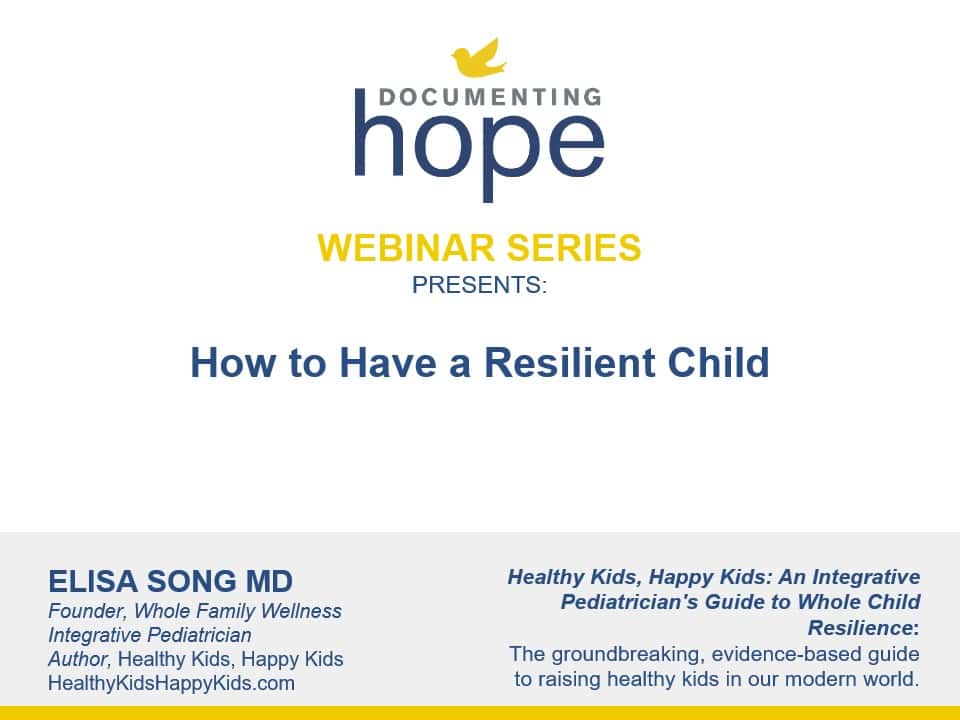The one job that remains steadfast, consistent and still in existence is being a parent. Every generation feels the same pressure of not really knowing exactly what they are doing no matter how many books have been written on the subject. But there is one common goal throughout every generation, and that is to raise resilient children.
What Does It Mean to Have Resilient Children?
What exactly are resilient children? In simple language, resilient children are children who can cope, deal and recover from difficulties, setbacks and changes in their everyday lives. In other words, they can basically bounce back from whatever challenges they may be confronting big or small. There are many ways to help children develop resilience, but what is most important is they have consistent support and nurturing adults in their lives.
Positive emotional attachments throughout childhood and adolescents builds resilience. Of course, resilience is determined by many different dynamics that interplay in a child’s life: their individual characteristics and skills as well as family traits and factors about their physical and social environments in which they were born. Infants need warmth, care and sensitivity to help them grow and be resilient and well-adapted children.
Children need to develop a sense of imagination, awareness and initiative at a young age to develop good decision-making skills so they can be resilient as they grow. They develop these skills with supportive people who teach them how to be flexible, how to make decisions, how to solve problems, how to set goals, persevere and attain them. Positive peer relationships, making friends, and cultivating social skills in their lives helps children grow and flourish into thriving teenagers and builds resilience.
Parents, Family, Friends, Teachers and Peers
A strong healthy relationship between parents is the best role model for children and especially teenagers. Parenting styles may vary especially among different cultures, but there are certain aspects of parenting styles that promote resilience no matter what the culture is:
- Being warm, nurturing and loving
- Providing firm, clearly defined rules and the reasons for the rules, while being flexible at the same time
- Having appropriate expectations
- Praising children for their efforts and accomplishments
- Comforting children when they’re upset
- Using reason and persuasion, instead of verbal or physical abuse
- Accepting and respecting teens’ increasing need for independence
It is also very important for young people to express their emotions, identify their feelings and communicate freely with family, friends, teachers and their peers so that anger and anxiety can be managed appropriately to help build resilience. Having a concept of self and self-worth increases the ability to value oneself and feel good about one-self. Positive thoughts reduce stress and anxiety as well as the possibility of developing mental health issues.
Other important factors in increasing resilience in children include:
- A healthy relationship between brothers and sisters who learn to share and cooperate among themselves
- Parents who are stable, eat healthy and are in good physical and mental health
- Parents who discourage competition among siblings
- Parents who embrace cultural or religious communities and a sense of belonging
- Parents and children who participate in home, school and community activities to develop a sense of belonging and connection
- A decrease in isolation
Studies indicate that the more protective factors a child has in their life, the more resilience they have and vice versa (See Resources, below). However, this doesn’t mean that a resilient child with many protective factors will not develop mental health problems and that a child with mental health problems cannot develop resilience. The question is: What we can do to ensure that any child will not develop mental health issues despite toxic stress. Is it possible?
How Can We Build Resilience in Children?
A child’s brain is most adaptable in the earlier years of life, but nonetheless, it’s never too late at any stage to build resilience. Providing opportunities to strengthen supportive relationships, increase adaptive skill-building, foster a sense of self-efficacy, flexibility, motivation, optimism and positive experiences will enable children to succeed in school. When children develop meaningful relationships in their lives, they feel hopeful about their future no matter what adversity they maybe struggling with.
Sports and exercise programs can also help build resilience in a child. Fun activities during and after school reduce stress, anxiety and burnout. Building self-confidence, self-identity and self-esteem and teaching children self-regulation and life skills can equip children with the necessary tools needed to cope and adapt during adversity in their lives. As confidence grows in a child, so does resilience.
Here are some special tips to help encourage meaningful relationship and empower your children to become more resilient:
- Make connections with friends, family and peers
- Help others and volunteering when possible
- Keep routines and schedules but with flexibility
- Factor in unstructured time to allow children to be creative
- Emphasize the importance of basic self-care of eating, sleeping and exercise
- Establish reasonable goals and acknowledge accomplishments
- Build trust by allowing them to solve problems and make appropriate decisions so they can handle future challenges
- Encourage positive and optimistic outlooks even in difficult times
- Help develop a level of competency by providing opportunities to master specific skills and strengths
- Look at difficult times as an opportunity for growth, understanding and self-discovery
- Help them know what they are capable of
- Accept change as part of life so it’s not scary and reestablish a new plan of action
- Build confidence
- Help children develop an internal moral compass to know the difference between right and wrong
- Build self-compassion to deal with failures, disappointments or mistakes
- Teach them how to be a contributor in a group and make a difference
- Have them develop coping skills to learn how to overcome stumbling blocks
- Teach problem-solving skills
- Encourage kids to bounce back after a setback
- Equip kids with the tools to face reality
- Don’t eliminate all the risks in your child’s life
- Avoid “why” questions and ask “how” questions instead
- Let your kids see the consequences of their actions
- Model adaptability
- Help kids manage their emotions
- Admit wrongdoing to your child if you’ve made a mistake
When children experience negative emotions such as sadness, anxiety, disappointment, fear or frustration, resilience is the one tool they have that lets them know these uncomfortable feelings are not going to last forever. Children with learning difficulties or disabilities might experience more challenges over increased anxiety in certain situations, but having resilience skills can help them have better control over their emotions and possibly help them overcome any obstacles or setbacks. Resistance is not learned over night and takes time and ongoing experiences for your child to develop resilience and learn how to respond to challenges.
Be a Resilient Parent
The New York Times article To Raise Resilient Kids, Be a Resilient Parent points out how parents instinctively want to always protect their children from pain and uncomfortable feelings, but a child needs to learn these skills on their own to be resilient. Solving every problem your child has does not give your child the skills to learn it themselves. Building your child’s self compassion helps them deal with disappointment, failures, mistakes and all the bumps in the road. It’s important for them to learn to be kind to themselves because setbacks are not always in our control. Praise your children so they know how you feel and that you support them.
Helping your child develop resilience can be as simple as the “right” response:
- Just because something seems difficult, that is not a reason not to do it.
- With some help, you’ll be able to overcome difficulties.
- No one masters a skill right away; they must practice.
- Don’t give up just because a skill takes practice to learn.
- When trying something new, it’s okay to ask for help from a parent or someone you trust.
- Overcoming something hard will make you feel good and will mean you can do it again in the future, and it probably will be easier.
- It’s okay to compete, and it’s also fine if you don’t win.
- If you don’t get it right the first time, it’s okay. You can always try again.
The Immune-Gut-Brain Axis
Looking at the psychological, emotional, community and family support in raising a resilient child are all very important and necessary. However, there is another support just as important and vital as all these above-mentioned supports, not yet mentioned. That support is the immune-gut-brain axis. In other words, the healthier and stronger the child’s immune system, the better connection between the gut and the brain, and the more resilience the child will have and be able to create.
Elisa Song MD, an integrative wholistic pediatric physician, trained in functional medicine and author of Healthy Kids, Happy Kids: An Integrative Pediatrician’s Guide to Whole Child Resilience, believes that the key to building resilience in children is to create whole-child resilience from the inside out. She focuses on building cellular resilience through increasing microbiome diversity by eating a wide variety of clean and healthy foods and creating the right cellular terrain. Ideally, the more nourishing the diet, the more resilient the child. Dr. Song describes how “microbiome magic” creates whole-child resilience and gut resilience with lots of fiber, phytonutrients and antioxidants and a variety of naturally colored foods and fermented foods.
According to Dr. Song, building cellular resistance does not mean that kids do not ever get sick. On the contrary, building cellular resilience means having the resilience to bounce back physically, immunologically and psychologically to be even stronger in preparation for the next time the child is sick. The key to cellular resilience is making smarter and more nourishing decisions for the microbiome, which ultimately helps regulate the child’s nervous system, keeps stress and anxiety levels low, improves the child’s quality of sleep, and keeps the production of neurotransmitters working to support brain functioning.
Does a Leaky Gut Cause a Child to Be Less Resilient?
In today’s toxic world, environmental toxins and ultra-processed foods overload the immune system with toxicity that will eventually cause a leaky gut. Even too much psychological stress can impact the immune system by overloading and disrupting the microbiome and contributing to a leaky gut. A leaky gut is formed when foreign substances enter the blood stream and cause malabsorption issues in the gastrointestinal tract.
If the gastrointestinal tract is full of Candida or other problematic yeasts, microbes, parasites, fungus, toxins or pathogens, then eventually malabsorption issues will occur. Malabsorption will prevent the gastrointestinal tract from taking nutrients from digested food via the vagus nerve to feed the brain. Artificial foods, food additives, colors, dyes, bad fats and other inflammatory foods are all big disruptors of the microbiome. Once the microbiome is disrupted, it releases zonulins. Zonulins are proteins that cause the gut to become more permeable meaning that important nutrients leak out of the cells and toxins can enter the cells. This is why the term “leaky gut” was formed.
Why the Vagus Nerve Is Important
The connection between the microbiome and the brain is via the vagus nerve. When malabsorption in the gut occurs, then the gut-brain-immune axis is disrupted. If the gut is inflamed from poor food choices and inappropriate dietary practices, then the gut’s ability to communicate through the vagus nerve is impaired, and the brain will experience brain fog or possibly other issues depending on the severity of the gut.
The microbiome is responsible for making neurotransmitters in the brain. Dopamine, serotonin, and GABA are all necessary to support brain functioning and to regulate the nervous system. Probiotic microbes are so important for the microbiome because stressors in today’s world tend to interfere with microbial balance.
Important Nutrients
One of the most important nutrients for children to optimize the immune system and keep them resilient is vitamin D3. Not everyone lives in a latitude that has high sun exposure, so nutritional supplementation is generally the next best option. Other important nutrients are choline, B vitamins, zinc, probiotics, minerals, enzymes and probiotics. Probiotics can come from supplements as well as fermented foods such as yogurt, kefir, sauerkraut, kimchi, fermented carrots, miso and kombucha.
Mind-Body Practices
Mind-body practices such as yoga, meditation and breathwork are also very important to incorporate in your child’s life and age appropriately. Parents should also know that an optimal heart rate variability (HRV) will also help monitor their child’s resilience. Lastly, teaching children to belly breathe to help calm down their nervous system in moments of fight or flight is also an excellent exercise for them. This video shows how Elmo learns to belly breathe.
Ultimately, the resilience of a child is dependent on the healthy microbiome, eating good quality foods with lots of variety, good brain support and a regulated nervous system that is not constantly in sympathetic overdrive the fight or flight mode, but rather in rest and digest. Dr. Song believes that changing the child’s diet to gut nourishing food will help improve the gut microbiome diversity, the ability to feed the brain which makes for a more resilient gut microbiome, a more resilient vagus nerve, a more resilient brain and ultimately a more resilient child.
About Teresa Badillo
In the 1980s she worked overseas in Rome, Italy at the Japanese Embassy in the office of the United Nations (FAO) as a speech writer. She also began her long journey in alternative healing while living in Rome.
After moving to New York and while raising her family of seven children, Teresa embarked on a mission to find alternative non-invasive biomedical, therapeutic, sensory and educational solutions for autism after the diagnosis of her son in the early 1990s.

She won a court case in 1995 against the Rockland County School District in New York to enable ARC Prime Time for Kids to be the first school using Applied Behavioral Analysis teaching method for autism that was paid for by the Rockland County School District. The following year she was instrumental in getting the New York Minister of Education to approve an extension of the ARC license from 5 to 21 years.
She has worked over the years in a number of alternative medical practices with doctors and practitioners organizing various biomedical intervention options for children with autism. Since the mid 1990s, Teresa has served on several boards:
- Foundation for Children with Developmental Disabilities
- The Autoimmunity Project
- Developmental Delayed Resources
- Epidemic Answers
She continues to consult and advise parents on all different areas of autism especially nutritional protocols. Since 2006 she has worked with NutraOrgana, LLC and BioCellular Analysis Testing. She currently researches, writes the newsletter and blogs Teresa’s Corner for The Autism Exchange (AEX). She also writes blog posts and pages for Documenting Hope.
Still Looking for Answers?
Visit the Documenting Hope Practitioner Directory to find a practitioner near you.
Join us inside our online membership community for parents, Healing Together, where you’ll find even more healing resources, expert guidance, and a community to support you every step of your child’s healing journey.
Sources & References
Ahuja, S.K., et al. Immune resilience despite inflammatory stress promotes longevity and favorable health outcomes including resistance to infection. Nat Commun. 2023 Jun 13;14(1):3286.
Bonaccio, M., et al. Mediterranean-type diet is associated with higher psychological resilience in a general adult population: findings from the Moli-sani study. Eur J Clin Nutr. 2018 Jan;72(1):154-160.
Burrows, T., et al. Effectiveness of dietary interventions in mental health treatment: A rapid review of reviews. Nutr Diet. 2022 Jul;79(3):279-290.
da Cunha, L.L., et al. Effects of exercise training on inflammatory, neurotrophic and immunological markers and neurotransmitters in people with depression: A systematic review and meta-analysis. J Affect Disord. 2023 Apr 1:326:73-82.
Dantzer, R., et al. Resilience and immunity. Brain Behav Immun. 2018 Nov:74:28-42.
Dinan, T.G., et al. The Microbiome-Gut-Brain Axis in Health and Disease. Gastroenterol Clin North Am. 2017 Mar;46(1):77-89.
Dogra, S.K., et al. Gut Microbiota Resilience: Definition, Link to Health and Strategies for Intervention. Front Microbiol. 2020 Sep 15:11:572921.
Grossman, P., et al. Mindfulness-based stress reduction and health benefits. A meta-analysis. J Psychosom Res. 2004 Jul;57(1):35-43.
Hantsoo, L., et al. Childhood adversity impact on gut microbiota and inflammatory response to stress during pregnancy. Brain Behav Immun. 2019 Jan:75:240-250.
Jacka, F.N., et al. A randomised controlled trial of dietary improvement for adults with major depression (the 'SMILES' trial). BMC Med. 2017 Jan 30;15(1):23.
Leipold, B., et al. Physical activity and nutrition in relation to resilience: a cross-sectional study. Sci Rep. 2024 Jan 27;14(1):2272.
Manigault, A.W., et al. Psychosocial Resilience to Inflammation-Associated Depression: A Prospective Study of Breast-Cancer Survivors. Psychol Sci. 2022 Aug;33(8):1328-1339.
McDonald, D., et al. American Gut: an Open Platform for Citizen Science Microbiome Research. mSystems. 2018 May 15;3(3):e00031-18.
Relman, D.A. The human microbiome: ecosystem resilience and health. Nutr Rev. 2012 Aug;70 Suppl 1(Suppl 1):S2-9.
Voigt, R.M., et al. The intestinal microbiota: determinants of resiliency? Lancet Healthy Longev. 2021 Jan;2(1):e2-e3.
Wastyk, H.C., et al. Gut-microbiota-targeted diets modulate human immune status. Cell. 2021 Aug 5;184(16):4137-4153.e14.
Whatnall, M.C., et al. Are Psychological Distress and Resilience Associated with Dietary Intake Among Australian University Students? Int J Environ Res Public Health. 2019 Oct 24;16(21):4099.
Yin, Z., et al. Dietary Diversity Was Positively Associated with Psychological Resilience among Elders: A Population-Based Study. Nutrients. 2019 Mar 18;11(3):650.
Resources
Articles
10 Tips for Raising Resilient Kids. PsychCentral.
Growing Up Resilient: Ways to build resilience in children and youth. CAMH.
Mead, Sarah. 7 Key Characteristics of Resilient Children. The Whitby School.
To Raise Resilient Kids, Be a Reslient Parent. The New York Times. 28 Mar 2018.
Raising Resilient Kids. Focus on the Family.
Resilience. Center on the Developing Child, Harvard University.
Resilience guide for parents and teachers. American Psychological Association. 2012.
Resilience: how to build it in children 3-8 years. RaisingChildren.net.au.
The Secret to Raising a Resilient Kid. The New York Times. 1 Sep 2021.
Books
Song, Elisa. Healthy Kids, Happy Kids: An Integrative Pediatrician’s Guide to Whole Child Resilience. Harvest, 2024.
Wilson, Debra Em. The Resilient Learners Backpack Workbook: 50 Mind-Body Activities to Enhance Focus, Regulation, and Engagement. Integrated Learner Press, 2024.
Wilson, Debra Em. The Resilient Learner’s Backpack: Mind-Body Activities for Focus, Regulation, and Engagement. Integrated Learner Press, 2024.
Videos
Sesame Workshop: Teaching Belly Breathing
Stephen Porges and Rick Hanson on Resilience







